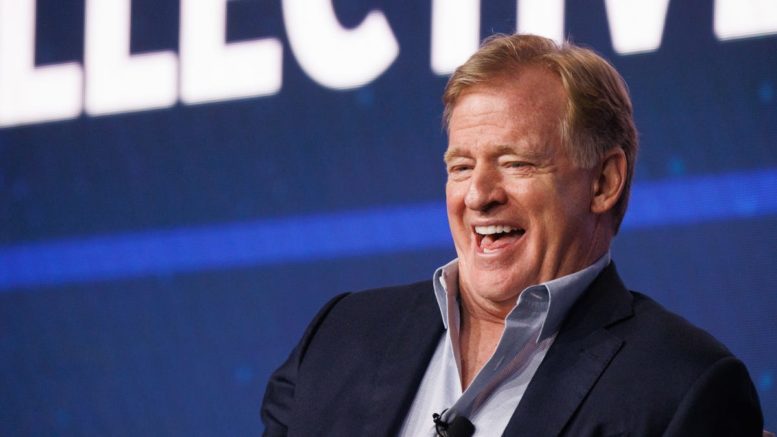Last week, my colleague Sean Beckwith wrote about the NFL possibly buying a stake in ESPN, and the potential for the self-proclaimed Worldwide Leader in Sports to become nothing more than the PR arm of the most popular league in America (at least, more than it already is). Yesterday, over at The Nation, Dave Zirin wrote of the problem of the lack of critical coverage of the NFL and what that means for one of the biggest and most profitable corporations in America, who already owns a day of the week. Consider this: About 25 million Americans attend church on Sundays; 22 million Americans watch the NFL on Sunday Nights alone, and the league averages over 17 million viewers per game. In terms of sheer numbers, we are talking about a company that is nearly as popular as God.
What does it mean, then, to have fewer and fewer reporters covering the NFL critically? In his excellent piece yesterday, Zirin wrote:
“Good journalism was already in danger at ESPN, but it is one thing to hide important reporting at the bottom of a website, and it is another thing to spike any efforts to investigate the NFL at all. If the NFL has decision-making power at ESPN, that is probably an inevitability. We have seen this with the NFL Network, which hired stellar reporters only, according to journalist and former employee Jim Trotter, to limit the extent to which they can ply their craft.”
Trotter goes on to recount the time the NFL Network shut down his reporting on the league’s reaction to Damar Hamlin’s injury in early 2023. And Zirin makes the case for why, if the NFL does buy a stake in ESPN, sports journalism as we know it could cease to exist. The entire piece is well worth your time. Because not only does the league buying into sports’ biggest media outlet mean less investigative coverage of Roger Goodell et al, it also means a lower quality of journalism for the masses.
Yesterday, a reporter got heat from all sides for asking Tampa Bay head coach Todd Bowles if he was doing anything special to prepare his team for playing in cold weather in Detroit, apparently not realizing that the Lions play at Ford Field, a domed stadium. And while everyone had a good laugh at the reporter who was too dumb to realize that the Lions play indoors, the situation probably surprised no one, as newsrooms have been decimated across the board, and reporters are, too often, having to cover multiple beats, some of which they aren’t well-versed in, to keep their jobs. Turns out, the outlet the reporter was representing no longer has a sports department.
Does the NFL investing in ESPN mean fewer reporters? Maybe, maybe not. It’s hard to envision a scenario where it means more reporters, especially as ESPN has recently subjected some of their top-tier talent to layoffs. I wrote last week about ESPN’s pivot to more screaming heads, like Pat McAfee and Stephen A. Smith, in place of programs that showcased actual journalism, like the dearly departed Outside The Lines. It’s probably a safe bet to assume that, should the NFL gain a seat at the ESPN table, they aren’t going to want the calls about The Shield’s many flaws to be coming from inside the house.
But one thing that no one is talking about when it comes to ESPN selling out to the NFL is the effect of the merger on reporters — and what that means to fans who turn to those reporters for information the league would rather suppress. The number of reporters employed in the sports media industry is shrinking by the day, as sports journalism becomes less about actual reporting and more about aggregation and AI-generated slide shows, despite vigorous and sustained pushback from journalists. But worse, nearly half of working journalists in the US say they have been harassed online, with 45 percent saying they have received threats of actual physical harm. People of color and women in journalism receive a disproportionate percentage of online harassment; a separate study found that 73 percent of women journalists worldwide have experienced online threats and harassment.
Speaking from personal experience, there are few things that fire up the trolls on X (formerly Twitter) like reporting on something about a league or a team or a player that their fans don’t want to hear. Ask anyone who has covered athletes accused of violence or NFL owners who have committed malfeasance. That’s when journalists are forced to choose: Do you want to see all the people threatening you in the comments/replies? Or would you rather protect your mental health and be blissfully ignorant of whether someone intends to harm you? There is no third option. Go ahead, go post about the allegations against Tyreek Hill or Ben Roethlisberger and see what happens to your mentions.
At the same time, reporters who regurgitate team press releases and refrain from commenting on wrongdoing by players and teams are rewarded with more access, potentially better assignments and, perhaps best of all, a lack of vitriol from the fan base. The more journalists that choose that path, the fewer who remain to cast a critical eye over the league. And when there are only a few reporters covering allegations against players, coaches and owners, they might as well sew a huge target onto the back of their winter coats. Because they’ll be sitting ducks for retaliation from the league and the online trolls. There is safety in numbers, and today, there are precious few sports reporters left to cover the “difficult” stories.
And outside of personal conviction, why would any reporter want to take the road less traveled? It’s far more fun to stick your head in the sand and cheer for your favorite players than it is to subject oneself to reporting on domestic violence, sexual assault, racism and owner misconduct. Most reporters got into this business because we love sports. But someone has to be willing to ask the hard questions.
In 2022, the NFL and its 32 teams generated $18.6 billion in total revenue, a billion more than it had the year before. That puts the league on par with companies like US Steel, Aramark, Colgate-Palmolive and Kohl’s, companies we would never consider leaving outside the purview of investigative journalism. Imagine if there was a scandal at US Steel and there was no one to cover it because US Steel bought into the Pittsburgh Post-Gazette or Philadelphia Inquirer? Most Americans would say that’s a bad idea, because it’s the media who typically holds large corporations accountable.
The NFL is no different. It’s an international organization that brings a lot of joy to a lot of people, but it’s not without its faults, and it’s simply too big and too influential to leave uninvestigated. It has the potential to do too much harm to too many people.
Original source here
#NFL #buying #ESPN #final #frontier #effort #kill #sports #journalism





